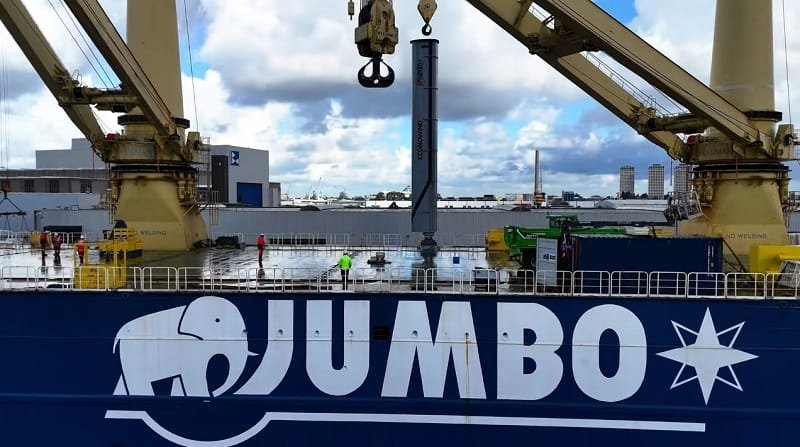Jumbo has announced the successful installation of two mechanical sails on its Heavy Lift Vessel (HLV), Jumbo Jubilee. This wind-assisted ship propulsion (WASP) system is the latest in a series of cutting-edge technologies applied to the vessel, aimed at enhancing fuel efficiency and reducing carbon emissions. This move underlines Jumbo’s commitment to advancing sustainability in heavy-lift shipping and exploring innovative decarbonization measures.
Daan Koornneef, CEO of Jumbo, emphasized the company’s dedication to fostering sustainable practices within the maritime industry. He stated, “At Jumbo, we believe that every step towards sustainability is crucial. The installation of these mechanical sails on Jumbo Jubilee is a testament to our commitment to decarbonise and innovate. While there’s always more work to be done, initiatives like this propel us closer to a greener maritime industry. We’re proud of our team’s continued efforts in making Jumbo a leader in sustainable shipping.”
Table of Contents
Unique Multi-Solution Approach
Jumbo’s strategy involves integrating multiple fuel-saving solutions on a single vessel, enabling the company to measure each technology’s individual impact on overall performance. Jumbo Jubilee has already seen several efficiency-enhancing measures, including an advanced propeller coating, an AI-powered anti-fouling monitoring system, and an eco-control system.
The latest addition, the installation of two Econowind ventofoils, will assess the effect of wind-assisted propulsion on the vessel’s performance. These sails are designed to reduce fuel consumption by utilizing wind power, contributing to lower carbon emissions.
Winds of Change: Insights from Mechanical Sails
Jumbo’s Technical Manager, Andres Casanova, noted the valuable data these sails will provide, stating, “While not fully optimised for our vessel type, these sails will help us gather valuable insights on real-world fuel savings and explore further optimisations that will allow Jumbo to reduce its environmental footprint even more.” He further explained that the small footprint of the sails makes them ideal for installation on heavy-lift vessels, where cargo space is at a premium.
The sails are mounted on a customized, in-house engineered frame by Jumbo structural engineer Estelle Bongers, allowing flexibility in their use. The system is designed to allow the sails to be moved or transferred to other vessels, ensuring that cargo space is maximized while improving fuel efficiency.
AI-Powered Anti-Fouling Monitoring System
Complementing the new ventofoils, Jumbo Jubilee is equipped with an innovative AI-powered anti-fouling monitoring system. This system tracks various data points such as vessel speed, geographical location, seawater temperature, and environmental conditions. By analyzing these variables, the system predicts when fouling is likely to accelerate, enabling Jumbo to perform proactive maintenance.
This technology is a key part of the company’s efforts to maintain optimal vessel efficiency and reduce fuel consumption. With predictive notifications, the vessel can undergo inspections and maintenance before fuel efficiency is significantly impacted, extending the lifespan of hull coatings and minimizing the need for aggressive cleaning methods.
Intelligent Cruise Control for Optimal Efficiency
Another fuel-saving technology on the Jumbo Jubilee is the eco-control system, which functions as an intelligent cruise control. Casanova described it as a system that allows operators to set a maximum speed or fuel consumption limit, after which the system continuously adjusts propeller pitch and RPM to ensure minimal fuel use and emissions. This contributes to the vessel’s optimal performance while significantly reducing its environmental impact.
A Collaborative Effort in Sustainability
Jumbo’s sustainability initiatives rely not just on advanced technologies but also on a strong collaborative effort across the organization. Technical Superintendent Patrick Feddes emphasized the importance of teamwork in achieving energy savings, stating, “If you want to reduce your environmental footprint, it’s not only down to one part of the company. It’s a team effort between those on board the ships and those on shore. The technologies play an important supporting role in creating energy savings, but a significant factor is awareness and cooperation throughout the various departments of the organisation.”
Casanova added, “It’s the years of technical expertise, in-house engineering, and strong teamwork that drive sustainable innovation from desk to deck.”
About Jumbo
Jumbo is a family-owned business with over 50 years of experience, operating in two main divisions: Shipping and Offshore. The company provides innovative and reliable heavy-lift transportation services across various industries, leveraging a fleet of state-of-the-art vessels with lifting capacities ranging from 650 to 3,000 tonnes.
In collaboration with the JSI Alliance, which includes SAL Heavy Lift and Intermarine, Jumbo offers comprehensive maritime transport solutions with a fleet of more than 50 vessels and operations in 25 countries. The company’s commitment to sustainability, safety, and quality has earned it a reputation as a leader in the maritime industry.
Jumbo Offshore focuses on delivering advanced transport and installation solutions to the Renewables, Subsea, and Offshore energy sectors worldwide, combining technical expertise and flexible service to meet client needs.
With the successful installation of mechanical sails and a suite of other fuel-saving technologies, Jumbo Jubilee exemplifies the company’s ongoing efforts to decarbonize the shipping industry and lead the way toward more sustainable maritime practices.
Source Jumbo Maritime

